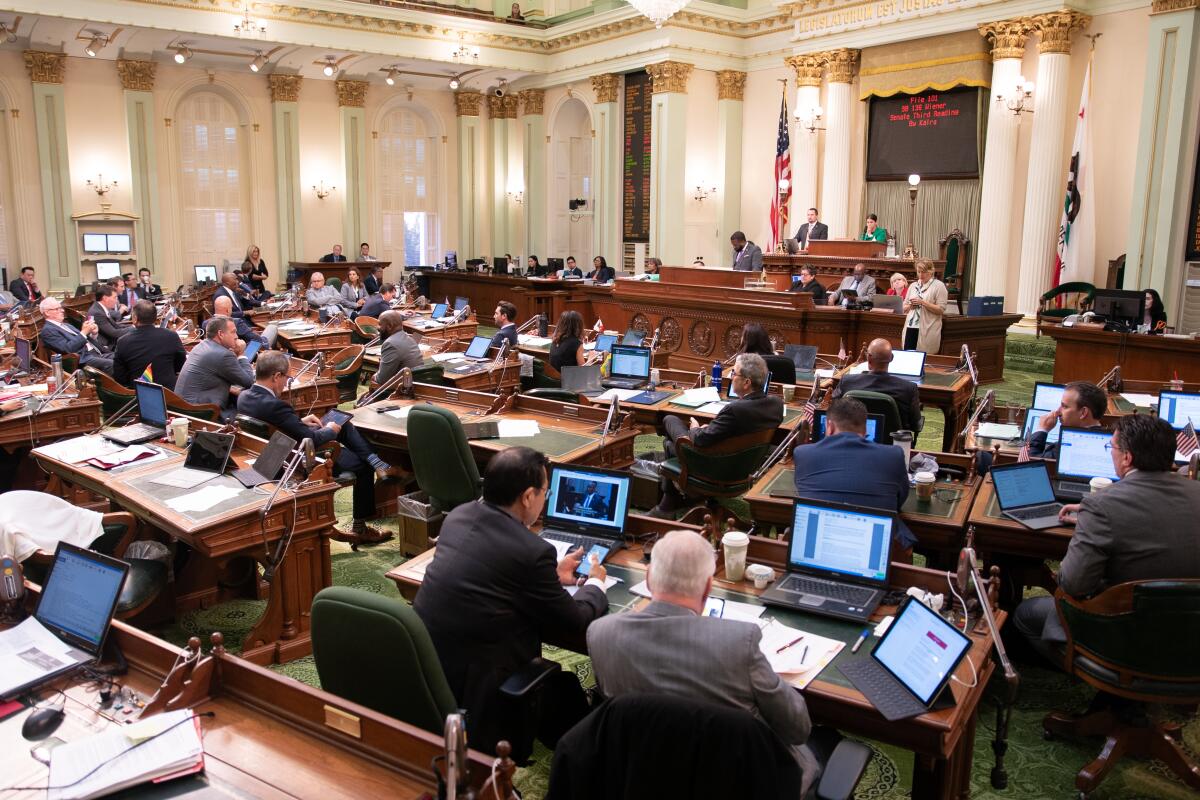Coronavirus could force pay cuts for California lawmakers, state workers

- Share via
SACRAMENTO — The California budget crisis caused by the coronavirus pandemic has put an end to seven straight years of pay hikes for state legislators and other elected officials and raises the possibility that they could see their salaries reduced.
The crisis has triggered provisions of a ballot measure approved by California voters in 2009 that prohibits a citizens commission that sets the salary of 132 elected officials from approving raises when there is a deficit.
Gov. Gavin Newsom said this month that the state faces a projected $54.3-billion budget deficit through early next summer, prompting austerity measures that include a 10% pay cut for rank-and-file state workers as well as himself.
The last time civil servants had their pay cut, during the Great Recession of a decade ago, the state Citizens Compensation Commission decided to also slash the salaries of elected officials including legislators, reasoning that they should share the pain of other state government employees.
That could happen again when the panel holds its annual meeting Thursday to set salaries for elected officials.
“I’d say it’s a possibility,” Commission Chairman Tom Dalzell said regarding a cut in pay. “If employees are asked to make a sacrifice, it could be seen that elected leadership should share in the sacrifice.”
Dalzell said he is waiting to take a position on the issue until he hears from other members of the seven-person commission, which was created by the state’s voters in 1990 and is appointed by the governor.
But the head of the Howard Jarvis Taxpayers Assn. said Friday that sparing legislators from the kinds of pay cuts facing most state workers, as well as many private-sector employees, would send the wrong message.
“It would reinforce in the minds of most average California citizens that our elected officials are just part of the elites and not connected very tightly to the real world,” said Jon Coupal, president of the taxpayer group.
Legislators said they were prepared to accept whatever decision is made by the compensation panel.
“The voters placed the determination of legislator salaries in the hands of an independent commission in good times and bad, and I will respect the decision that the commission makes,” said Senate President Pro Tem Toni Atkins (D-San Diego).
The panel’s actions over the years have made Newsom the highest-paid governor in the nation at $209,747 while California legislators are the second-highest paid, after New York, with an annual base salary of $114,877. The citizens commission also sets salaries for the lieutenant governor, attorney general, treasurer, controller, secretary of state, insurance commissioner, superintendent of public instruction and members of the Board of Equalization.
A 2009 ballot measure approved by California voters to rein in state spending prohibits the commission from giving pay raises to elected officials if the state’s general fund is expected to end the year with a deficit.
In a letter dated May 15, the state Department of Finance informed the commission of this year’s deficit, so the only decision left to the citizens panel is whether to maintain the pay levels as they are or make reductions.
The commission cut elected officials’ pay by 18% in 2009 after the governor and Legislature furloughed state workers to balance a budget hit hard by the Great Recession.
The elected officials’ salaries are just getting close to what they were before the recession.
Coupal said pay cuts for legislators are warranted. “I would think given the economic crisis that we are currently in and that we are on the borderline of a fairly deep recession, that it would be appropriate,” he said.
Earlier this month, Newsom said the state would begin bargaining with state employee unions to reduce pay by approximately 10% starting July 1 to save $2.8 billion next fiscal year.
“The state will make every attempt to reach these savings through collective bargaining,” the governor’s budget says. “However, the administration will include a budget provision to impose reductions if the state cannot reach an agreement.”
Proposed cuts have already drawn backlash from state workers and their representatives, including Tim Edwards, president of Cal Fire Local 2881, the union for 6,000 current and retired state firefighters and other employees.
“It’s a bad and dangerous policy. It’s arbitrary,” Edwards told a legislative committee at a hearing on the proposed pay reductions Thursday. “We strongly and absolutely reject any cuts to state employees.”
The independent Legislative Analyst’s Office recommended this week that state negotiators consider alternatives to furloughs as the state seeks to reduce payroll costs. Alternatives are also being explored by SEIU Local 1000, the largest state employee union, representing 96,000 mostly blue-collar state workers.
Newsom’s offer to work with the unions on a solution is better than what happened a decade ago, when employee pay was slashed by directive, said SEIU spokesman Brian Nash.
“The 15% pay cut, and the devastation it wrought, was unnecessary,” Nash said. “We could have gone through a process like we’re doing now. Instead, people lost their homes and their ability to provide for their families.”
The union is declining to publicly discuss alternatives to pay cuts. “It’s not in the best interest of our members to divulge our strategy prior to sitting down at the bargaining table with the state,” Nash said.
More to Read
Sign up for Essential California
The most important California stories and recommendations in your inbox every morning.
You may occasionally receive promotional content from the Los Angeles Times.











